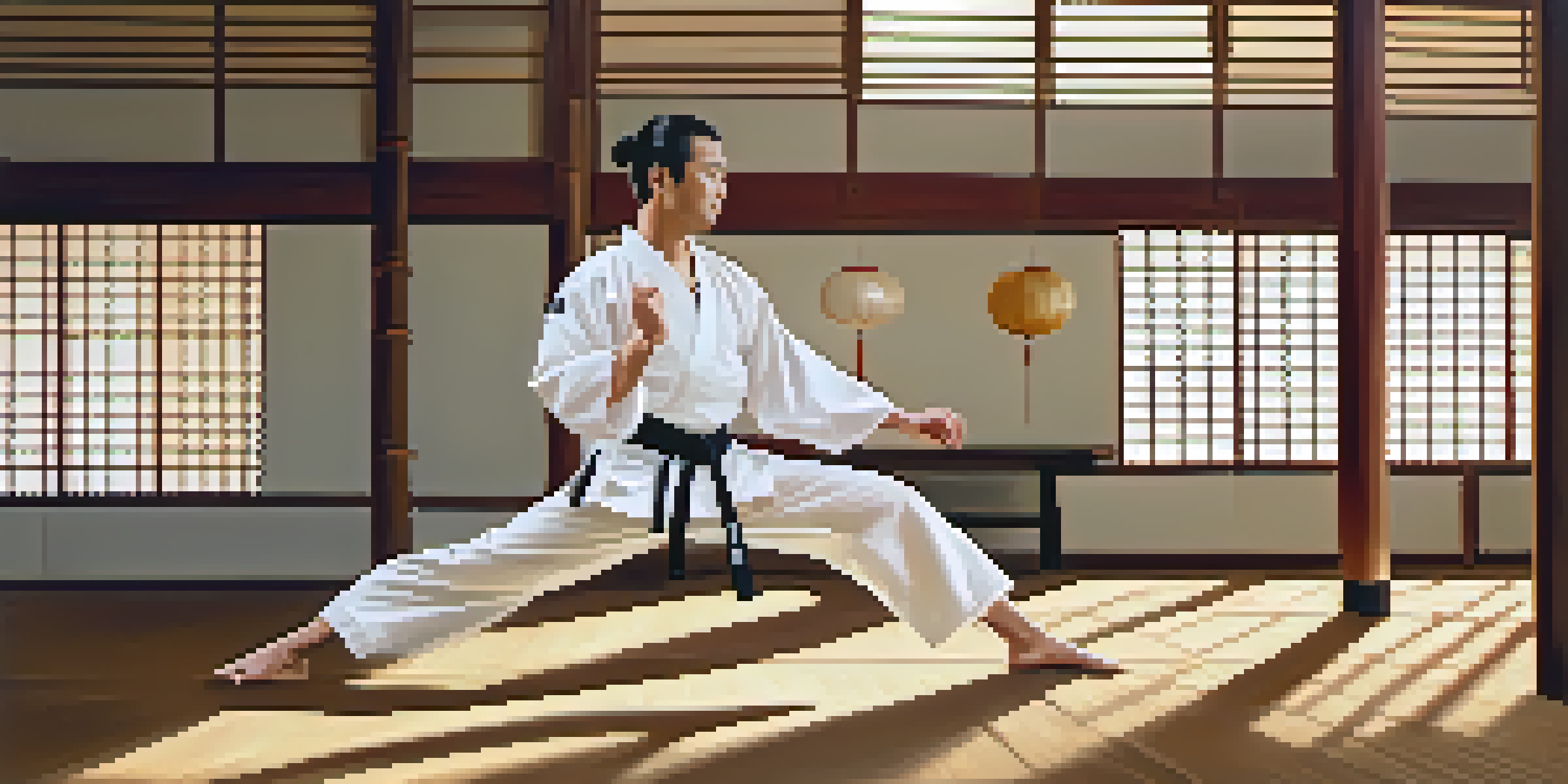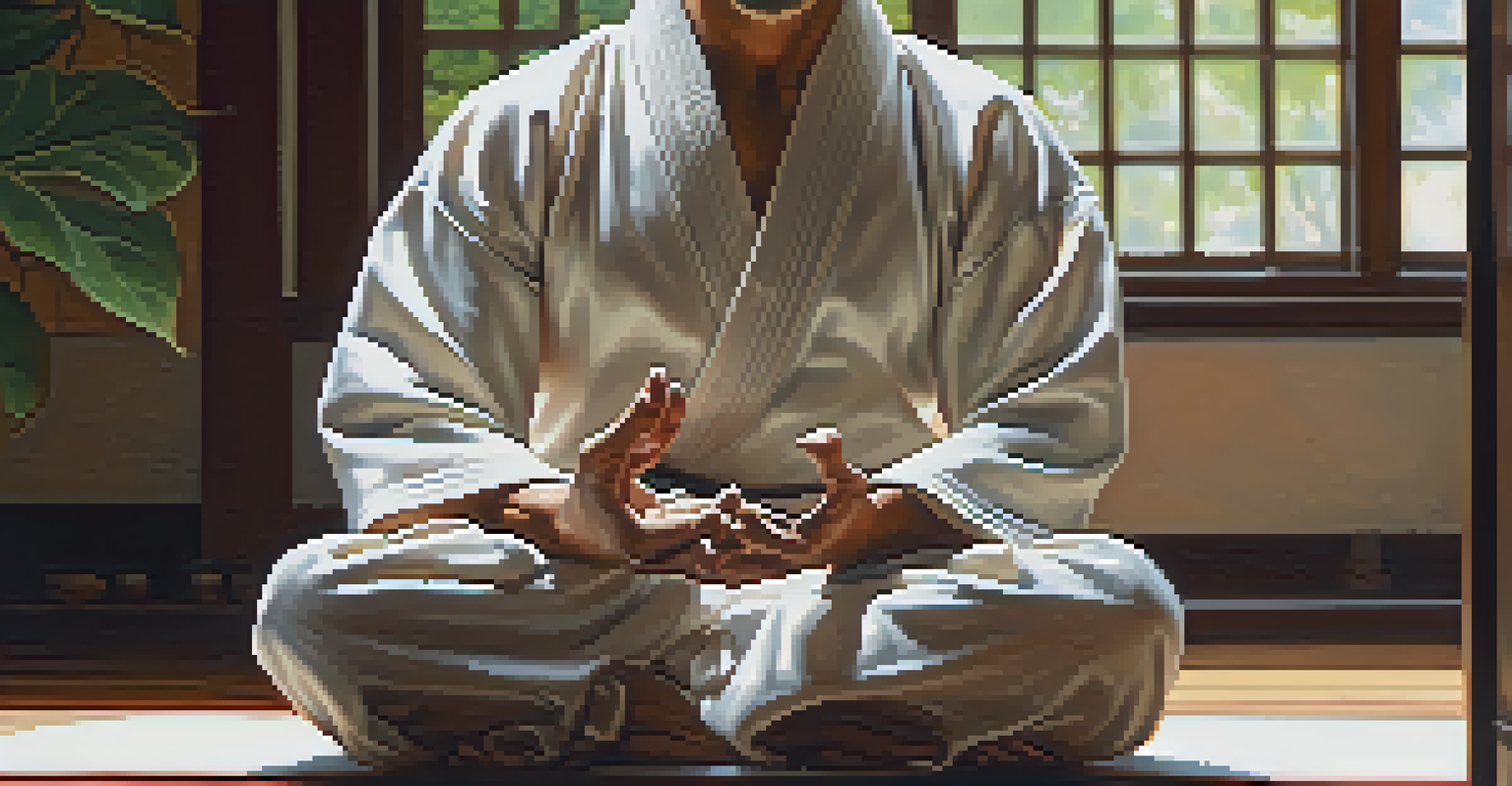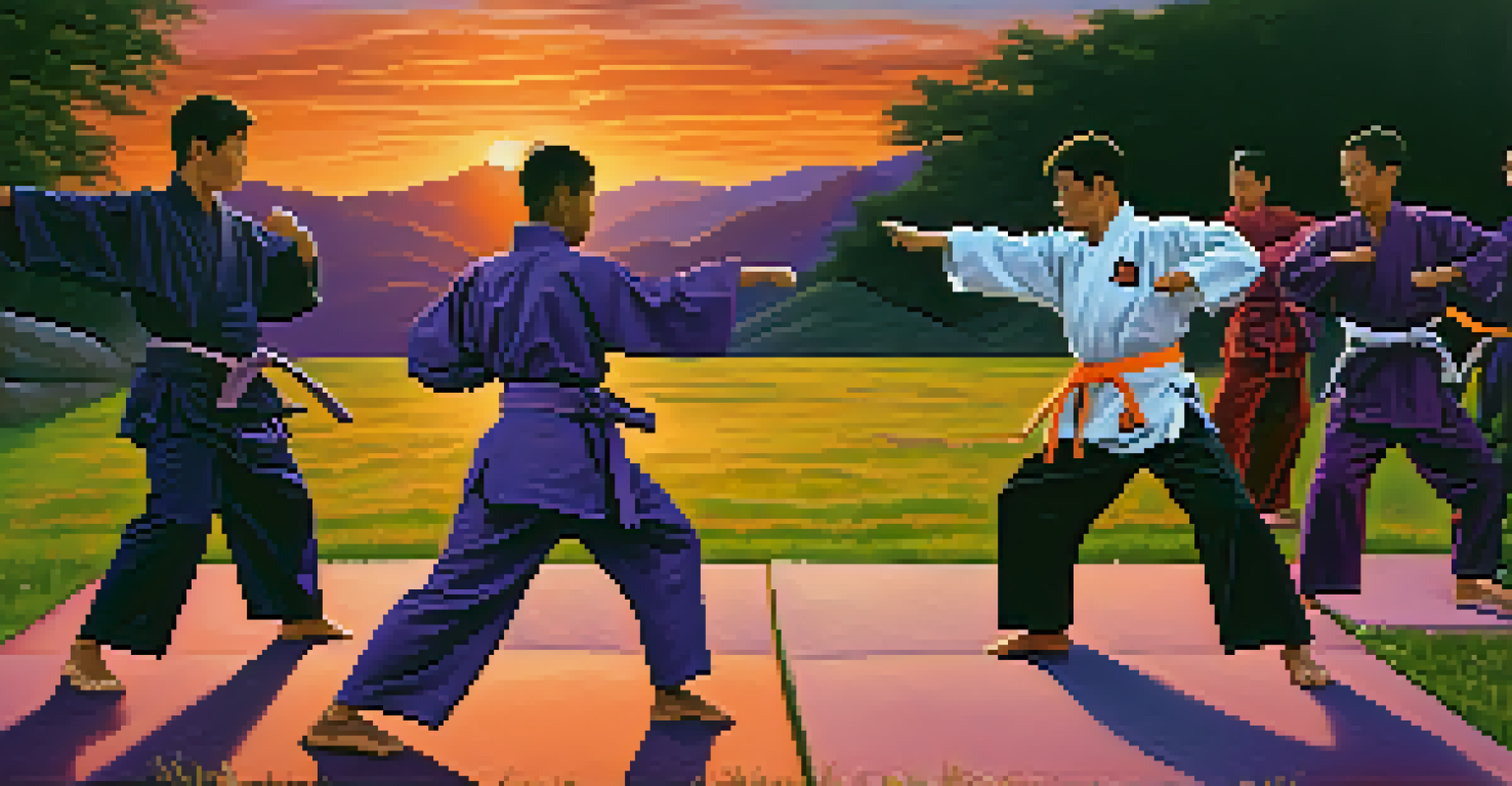Integrating Mindfulness in Martial Arts for Rehabilitation

Understanding Mindfulness and Its Benefits
Mindfulness is the practice of being present in the moment, fully engaged with your thoughts and surroundings. This approach can significantly enhance physical and mental well-being, making it a valuable tool in rehabilitation. By focusing on the present, individuals can reduce anxiety and stress, which are common hurdles in recovery.
Mindfulness isn't difficult. We just need to remember to do it.
Incorporating mindfulness into rehabilitation not only helps with emotional stability but also aids in physical recovery. People often find that when they engage with their bodies mindfully, they can better understand their limitations and capabilities. This awareness fosters a more compassionate relationship with oneself during the healing process.
Moreover, studies have shown that mindfulness can improve focus and concentration, which are essential when practicing martial arts. As individuals learn to connect with their breath and body, they become more attuned to their movements, leading to better performance and reduced risk of injury.
The Role of Martial Arts in Rehabilitation
Martial arts are often recognized for their physical benefits, such as increased strength, flexibility, and coordination. However, they also offer significant mental and emotional support, making them an excellent choice for rehabilitation. The discipline required in martial arts teaches patience and resilience, qualities that are vital during recovery.

Practicing martial arts can serve as a structured outlet for individuals recovering from injuries or trauma. The rigorous training routines encourage individuals to push their limits safely while also promoting self-discipline. This aspect can empower individuals, helping them regain confidence as they progress in their rehabilitation journey.
Mindfulness Enhances Recovery
Practicing mindfulness can significantly reduce anxiety and stress, promoting better mental and physical well-being during rehabilitation.
Additionally, martial arts often emphasize community and support, which can be incredibly beneficial for those in recovery. Being part of a group can help individuals feel less isolated, providing motivation and camaraderie that enhances the overall rehabilitation experience.
Integrating Mindfulness into Martial Arts Training
To effectively integrate mindfulness into martial arts, instructors can begin by incorporating breathing exercises into their warm-up routines. Focusing on breath not only calms the mind but also prepares the body for movement, enhancing overall performance. This simple practice can set a positive tone for the entire training session.
The more you practice, the better you get, the more freedom you have to create.
Another effective strategy is to encourage students to engage in mindful movement during their practice. This means paying attention to each motion, from the flow of punches to the precision of kicks, fostering a deeper connection with their bodies. By doing so, practitioners can develop better control and awareness, which is crucial for rehabilitation.
Finally, incorporating moments of reflection at the end of training can help solidify the mindfulness experience. Allowing time for meditation or journaling about their feelings and progress can encourage individuals to internalize their growth and challenges, reinforcing the benefits of mindfulness in their martial arts practice.
Mindfulness Techniques for Practitioners
Several mindfulness techniques can be employed by martial arts practitioners to enhance their focus and presence. One effective method is body scanning, where individuals mentally check in with different parts of their bodies, promoting relaxation and awareness. This technique can help practitioners identify tension areas that may need attention during their training.
Another popular technique is visualization, where practitioners imagine themselves successfully executing techniques or overcoming challenges. This mental rehearsal can boost confidence and reinforce positive outcomes, essential for anyone on a rehabilitation journey. By visualizing success, individuals can create a mental roadmap for achieving their goals.
Martial Arts Builds Resilience
Engaging in martial arts provides a structured and supportive environment that fosters patience and confidence in individuals recovering from injuries or trauma.
Finally, incorporating gratitude practices can further enhance mindfulness. By regularly acknowledging what they appreciate about their training or progress, practitioners can cultivate a positive mindset that supports resilience and motivation throughout their rehabilitation.
Benefits of Mindfulness in Recovery
The benefits of integrating mindfulness into martial arts for rehabilitation are profound. Not only can it help alleviate symptoms of anxiety and depression, but it also promotes a more holistic approach to healing. By addressing both the mind and body, individuals can achieve a more balanced recovery.
Practitioners often report increased emotional regulation, which can be particularly beneficial for those dealing with trauma or chronic pain. Mindfulness encourages individuals to respond to their feelings rather than react impulsively, fostering a sense of control over their recovery process. This empowered mindset is crucial for long-term healing.
Moreover, as individuals become more aware of their bodies and emotions, they often develop a greater sense of self-acceptance. This acceptance can significantly enhance motivation, as practitioners learn to appreciate their unique journeys rather than compare themselves to others.
Challenges in Integrating Mindfulness
While the integration of mindfulness into martial arts for rehabilitation has many benefits, it does come with its challenges. One common obstacle is the misconception that mindfulness is solely about relaxation. In reality, it requires active engagement and practice, which can be daunting for some individuals.
Additionally, some practitioners may struggle with the patience required for mindfulness. In a fast-paced world, the idea of slowing down and focusing on the present can feel counterintuitive. However, overcoming this hurdle can lead to significant breakthroughs in both martial arts performance and rehabilitation.
Mindfulness Techniques Boost Focus
Incorporating mindfulness techniques like body scanning and visualization can enhance focus and emotional regulation, crucial for successful rehabilitation.
Lastly, finding the right mindfulness techniques that resonate with each individual can be a trial-and-error process. What works for one person may not work for another, so it's essential to be open and adaptable in exploring different practices and approaches.
Conclusion: A Path to Holistic Healing
Integrating mindfulness in martial arts for rehabilitation offers a unique and powerful approach to healing. By combining physical training with mental awareness, individuals can experience a more comprehensive recovery. This dual focus not only addresses the physical aspects of rehabilitation but also nurtures emotional and mental well-being.
As practitioners learn to be present and mindful, they cultivate resilience and confidence, essential traits for overcoming challenges. Mindfulness encourages a deeper connection with oneself, which can be particularly transformative during recovery. It's about more than just physical prowess; it's about developing a holistic understanding of the self.

Ultimately, the journey of rehabilitation through martial arts and mindfulness is one of growth and discovery. By embracing both practices, individuals can find strength, healing, and a renewed sense of purpose, paving the way for a healthier and more fulfilling life.